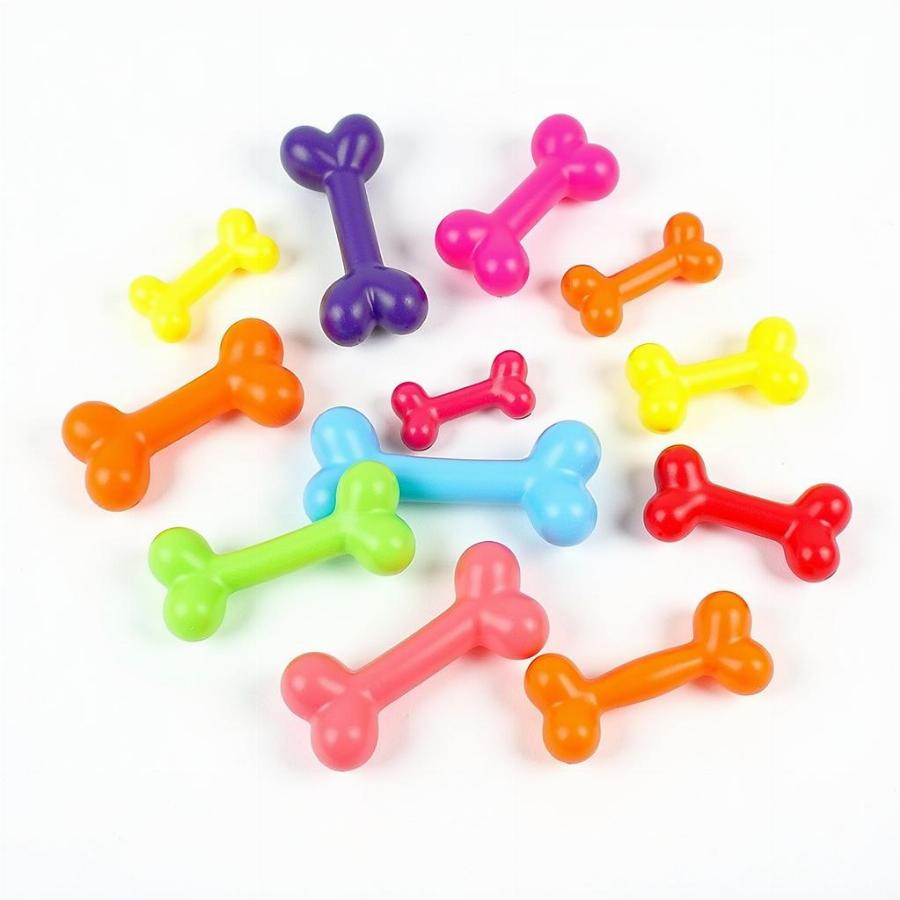Bone dog toys are a popular choice for pet owners, offering a natural outlet for chewing instincts and providing entertainment for our furry friends. But are all bone dog toys created equal? The answer is a resounding no. Choosing the right bone dog toy for your pup is essential for ensuring their safety and well-being.
This comprehensive guide will delve into everything you need to know about bone dog toys, from understanding the different types to selecting the safest options and maximizing the benefits for your beloved canine companion.
Understanding the Allure of Bone Dog Toys
Dogs have a natural instinct to chew, and bone dog toys cater to this primal urge. Chewing isn’t just a fun pastime for dogs; it offers a range of benefits:
- Dental Health: Chewing on bone dog toys helps to scrape away plaque and tartar, promoting healthy teeth and gums.
- Mental Stimulation: The act of chewing can be mentally stimulating for dogs, helping to alleviate boredom and prevent destructive chewing behaviors.
- Emotional Well-being: Chewing releases endorphins in dogs, which have mood-boosting effects and can reduce anxiety.
Types of Bone Dog Toys
Navigating the world of bone dog toys can feel overwhelming with the variety available. Here’s a breakdown of the most common types:
1. Natural Bones
- Pros: Natural bones, like those from cows or bison, offer a truly authentic chewing experience.
- Cons: Natural bones can pose a choking hazard or splinter, potentially causing injuries to your dog’s mouth, throat, or digestive tract.
Important Considerations: If you choose to give your dog natural bones, always supervise them closely and select bones that are appropriately sized for your dog’s breed and chewing strength.
2. Synthetic Bones
- Pros: Synthetic bone dog toys are designed to be more durable and long-lasting than natural bones, and they often come in a variety of flavors and textures to appeal to different dogs.
- Cons: Some synthetic bones can be too hard and may pose a risk of tooth damage, especially for aggressive chewers.
Important Considerations: Look for synthetic bones made from durable, non-toxic materials, and choose a size and shape that’s appropriate for your dog’s chewing habits.
3. Nylon Bones
- Pros: Nylon bones are known for their durability and come in a range of shapes, sizes, and flavors. They can withstand even the most powerful chewers.
- Cons: Nylon bones can be quite hard and may not be suitable for all dogs, especially those with sensitive teeth.
Important Considerations: Select nylon bones from reputable brands that prioritize safety and quality. Consider offering a variety of textures and shapes to keep your dog engaged.
 Variety of nylon bone dog toys
Variety of nylon bone dog toys
4. Rubber Bones
- Pros: Rubber bones offer a softer chewing experience, making them a good option for puppies or senior dogs with sensitive teeth.
- Cons: Rubber bones may not be as durable as nylon or natural bones, and some dogs may be able to chew through them quickly.
Important Considerations: Choose rubber bones made from durable, non-toxic rubber, and look for options with textured surfaces to provide additional chewing satisfaction.
Choosing the Right Bone Dog Toy: Factors to Consider
Selecting the right bone dog toy is crucial for your dog’s safety and happiness. Consider these factors when making your choice:
- Size: The bone toy should be large enough that your dog can’t fit the entire thing in their mouth, reducing the risk of choking.
- Chew Strength: Assess your dog’s chewing habits. Aggressive chewers will need more durable options than gentle chewers.
- Age: Puppies and senior dogs often benefit from softer toys, while adult dogs can typically handle harder bones.
- Health Conditions: If your dog has any dental issues or allergies, consult with your veterinarian for recommendations.
Bone Dog Toy Safety Tips
- Supervision: Always supervise your dog when they’re playing with bone dog toys.
- Inspection: Regularly check the toy for signs of wear and tear, and discard any damaged toys.
- Variety: Offer a variety of toys to keep your dog engaged and prevent them from becoming fixated on one particular toy.
- Dental Checkups: Schedule regular dental checkups for your dog to maintain optimal oral health.
Bone Dog Toys: A Rewarding Experience
Bone dog toys can provide numerous benefits for your canine companion, satisfying their natural instincts and promoting physical and emotional well-being. By understanding the different types, choosing wisely, and prioritizing safety, you can make bone dog toys a rewarding and enriching part of your dog’s life.
FAQs About Bone Dog Toys
1. Are cooked bones safe for dogs?
No, cooked bones are dangerous for dogs. They can splinter easily, causing serious internal damage.
2. Can I give my puppy a bone dog toy?
Yes, but choose soft rubber bones specifically designed for puppies. Avoid hard bones that can damage their developing teeth.
3. How often should I replace my dog’s bone toy?
Replace any toy that becomes damaged or shows signs of wear and tear. Regularly inspect your dog’s toys to ensure their safety.
Looking for More Advice on Dog Toys?
- Check out our article on “dog dental plaque remover” for tips on maintaining your dog’s oral hygiene.
- Explore our selection of “tracy dog toy” for durable and engaging options.
Beaut Dogs: Your Partner in Canine Care
Beaut Dogs is your trusted source for all things dog-related. We’re passionate about providing pet owners with accurate and insightful information to help them provide the best possible care for their furry companions. If you have any questions or need personalized advice, don’t hesitate to reach out to us at [email protected].